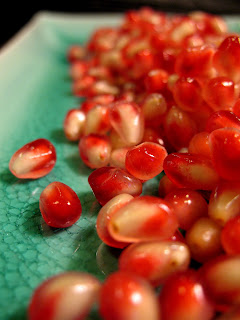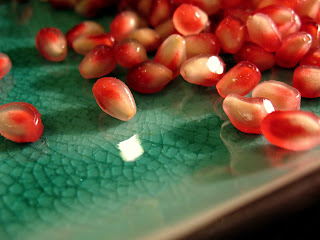
I was wandering through the produce section at one of the local markets this weekend when I was stopped in my tracks. Half way across the area, a basket rested on the exotic fruit table, filled with pomegranates. True, they weren't especially large or red, but they were there! Two whole months before I expected to see one! I exercised great restraint by only buying two instead of the whole basket.

The pomegranate is my favorite fruit, not only because it's delicious, but also because of the mythology surrounding it. In Greek myth, Persephone was tricked into staying in the Underworld when she ate six pomegranate seeds. In Jewish tradition, there are 613 seeds in a pomegranate, corresponding to the 613 commandments of the Torah. In Christian iconography, Christ is often holding a pomegranate in Virgin and Child scenes.

The pomegranate (or nur) is also one of the symbols of Armenia, representing marriage, fertility and abundance. Throughout the Middle East, pomegranates are used in wedding rituals; the more seeds in the fruit, the more fruitful the marriage will be.

The health benefits of pomegranates are tremendous, as well, as the recent surge of pomegranate-related products supports. The antioxidants in the fruit are especially beneficial for the heart... but if you want all the details, a quick web search will provide what you're looking for.

Despite the millions of pomegranate products, I'll be sticking with the real thing when I can find it. There's something so zen about peeling the arils, or seeds, out from the leathery skin, sampling a tart seed now and again.
Note: The title for this post comes from the poem "Garden Song," translated by Ezra Pound and Noel Stark, second-hand from Egyptian hieroglypics, about the pomegranate.
No comments:
Post a Comment